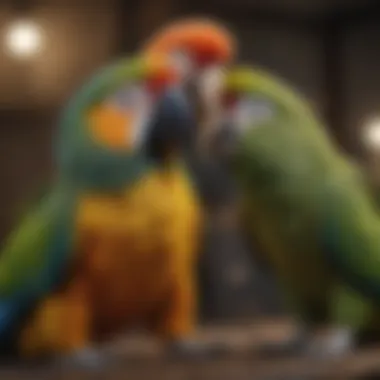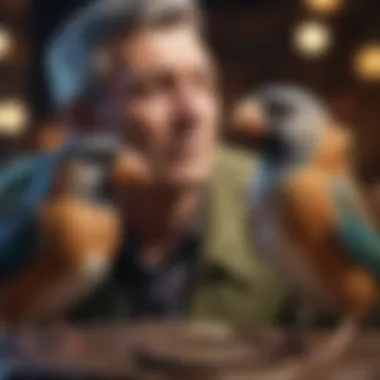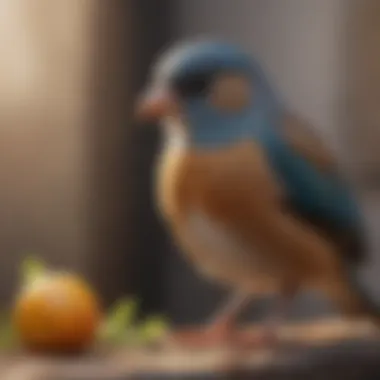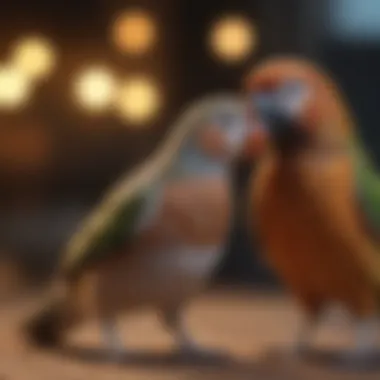Understanding Jealousy in Pet Birds: An Insightful Analysis


Intro
Jealousy in our feathered friends isn't just the stuff of cartoonish tales or fanciful thoughts; it’s a real aspect of their emotional realms. When a parrot squawks loudly or a canary fluffs up in frustration whenever you attend to another pet, there lies a nuanced interplay of feelings at work. Birds possess the ability to form attachments, feel territorial, and even experience envy, making it crucial for owners to understand these emotions. Grasping the essence of jealousy in pet birds allows us to connect with them on a more profound level and can lead to a harmonious home environment for both pets and their humans.
Understanding this emotion can play a pivotal role in strengthening the bond between you and your avian companion. It's not unusual for pet birds to react strongly when they perceive a perceived rival, often manifesting in various ways. Observing these behaviors and recognizing the signs is key to addressing and managing their feelings effectively. In this foundation of our exploration, the forthcoming sections will open a window to the behaviors that illuminate jealousy, along with actionable strategies that can transform your pet's emotional experience.
As we journey through this article, you'll gain insights that make the complexities of bird jealousy easier to navigate. Prepare to delve into a rich panorama of emotions, needs, and responses that characterize pet birds as they grapple with jealousy.
Defining Jealousy in Animals
Understanding the nuances of jealousy in animals offers substantial insights into their emotional lives, particularly for pet bird owners seeking deeper connections with their feathered companions. The complexity of this emotion can influence behavioral dynamics between pets and their human caretakers. Recognizing and defining jealousy isn't merely an exercise in animal psychology; it's pivotal for enhancing care strategies and nurturing harmonious living conditions. When pet owners become aware of the signs of jealousy and its underlying causes, they can take steps to foster a more inclusive environment. This ultimately leads to better emotional health for the birds, and a more satisfying pet-owner relationship.
Understanding Jealousy in a Biological Context
From a biological standpoint, jealousy in animals may be viewed through the lens of evolutionary psychology. Birds, much like many social species, exhibit emotions that serve adaptive functions in their environments. When exploring jealousy, one might argue that it emerges as a response to threats against established social bonds.
Birds in the wild often require strong social structures for survival. The introduction of outsiders, whether that be other birds or pets, can disturb these structures. A parrot, for example, may feel threatened when a new pet is brought into the home, or when a human shifts their focus to another bird.
Research shows that certain species exhibit behaviors that indicate feelings of jealousy, such as increased vocalization, aggression, or withdrawing from social engagement. Observing these behavioral cues provides a framework for understanding the instinctual roots of jealousy, which can be traced back to fundamental needs for social security and bonding.
Emotional Capacities of Birds
Birds are often underestimated as emotional beings. It's essential to recognize that they possess a range of emotional responses, similar to those in mammals. Studies have shown that birds like African grey parrots and cockatoos can form strong emotional attachments and exhibit behaviors reflecting joy, fear, and yes, jealousy.
- Learning & Social Interaction: In avian communities, learning occurs through social interactions. Young birds observe their parents and peers, adapting behavior not just for survival, but for emotional bonding. This learning shapes how they respond to situations that may evoke jealousy.
- Expressiveness: Parrots, known for their affectionate nature, often express feelings loudly—whether it’s through mimicry, specific whistles, or even by pushing away a perceived rival. Such expressiveness reflects not just jealousy, but an array of emotions that contribute to their personality.
- Emotional Memory: Birds can recall past experiences that tie emotional significance, meaning they may remember situations where they felt jealous or secure. This memory influences future interactions and responses, underscoring how their emotional capacity shapes behavior.
To conclude, a solid grasp of avian emotional capacities provides pet owners with tools to navigate their bird's complex behaviors effectively. Recognizing the roots of jealousy can lead to better strategies for managing it, ultimately fostering a more loving and understanding relationship.
Theoretical Perspectives on Bird Behavior
Examining bird behavior through various theoretical lenses opens up a treasure trove of insights into avian emotions, social interactions, and their psychological make-up. Understanding these perspectives is vital for pet bird owners, as it sheds light on why their feathered companions might exhibit signs of jealousy. When we delve into how birds interact within their social structures or how their evolutionary background influences these behaviors, it becomes clear that pet ownership is not just about feeding and caring for a bird. It’s about recognizing the intricate emotional lives that these creatures lead.
The layered complexity of bird behavior warrants thoughtful consideration, particularly when addressing jealousy. Although jealousy might appear as an anthropomorphic interpretation, examining it through evolutionary frameworks or social structures reveals its real and significant place in avian life. This nuanced understanding allows bird owners to anticipate their pets' feelings, creating a more harmonious household.
Evolutionary Implications of Social Bonding
Social bonding in avian species carries substantial evolutionary implications. Birds are inherently social creatures, often forming tight-knit communities that are essential for survival. The innate need for social connections may explain why some birds display jealousy. For example, in species like African Grey Parrots or Cockatoos, forming strong attachments to their owners can trigger possessive behaviors in situations where perceived rivals for attention emerge.
Through evolution, traits that aid in forming social bonds became advantageous. This bonding can lead to cooperation in tasks like foraging or defending against predators. Recognizing one's place in the social hierarchy becomes crucial, especially when competition arises over resources—in this case, the love and attention of their human companions. Jealousy, then, can be viewed as a behavioral mechanism that keeps social structures intact, ensuring birds maintain their value within their flock, even if that flock includes humans.
Social Structures in Avian Communities
The social structures in avian communities are as diverse as the species themselves. Birds often establish hierarchies within their social groups based on variables such as age, size, and personality. Understanding the dynamics of these interactions is essential to grasping how jealousy manifests in pet birds.


In many bird species, like Budgerigars and Lovebirds, hierarchy plays an important role in relationships. Older or more dominant birds may receive preferential treatment from owners, leaving subordinate birds feeling marginalized or ignored. Thus, when a new pet arrives, or when a child plays with one bird over another, the feelings of jealousy can manifest clearly.
Here’s a look at how social structures heighten the complexity of behaviors associated with jealousy:
- Competition for Resources: Birds often compete for food, space, and affection, leading to jealous behaviors when insufficient resources are available.
- Rank and Status: Lower-ranking birds may react to changes in the social pecking order, possibly leading to jealousy when they perceive threats to their status.
- Affinity and Attachment: Birds develop preferences for certain companions, be they humans or fellow birds, heightening the emotional stakes during interactions.
In summary, understanding the theoretical perspectives on bird behavior equips pet owners with a better framework for navigating their feathered companions' emotions. By recognizing the evolutionary and social undercurrents influencing jealousy, owners can foster stronger and more satisfying relationships with their birds.
Signs of Jealousy in Pet Birds
Recognizing signs of jealousy in pet birds is crucial for understanding their emotional needs and well-being. Some people might think that birds are just feathered creatures without complex feelings, but make no mistake: they can express jealousy quite vividly. Identifying these signs allows you to adjust your interactions, fostering a more harmonious environment for both you and your bird. Addressing jealousy not only enhances the bond you share but also promotes a healthier emotional state for your avian friend. By learning about these indicators, pet owners can respond more effectively to their birds, creating a nurturing atmosphere.
Behavioral Indicators of Jealousy
Birds can be quite expressive, and their behavior often reveals their inner thoughts. When a pet bird feels a sense of jealousy, it may act out in certain ways. Look for these behavioral indicators:
- Increased Aggression: A bird might become nippier towards you or even other pets in the home, particularly when they feel a rival is receiving your attention.
- Clinginess: You might notice your bird becoming overly attached to you, endlessly seeking your presence or attention when another pet is nearby.
- Disruptive Actions: Some birds resort to knocking over toys or making louder-than-usual noises to pull you away from whatever—or whoever—you’re focused on.
- Withdrawal: On the opposite end of the spectrum, some birds might choose to isolate themselves, preferring to sit quietly and observe rather than engage.
Understanding these signals can lead to better communication. Recognizing when your pet bird is feeling left out helps to prevent potential issues down the line. It's essential to monitor these behaviors and adapt accordingly to minimize the likelihood of jealous outbursts.
Vocalizations Associated with Jealousy
Birds are talkative creatures, and their vocalizations can tell you a lot about their emotional state. A jealous bird might alter its usual sounds. Pay attention to the following vocal patterns:
- Screaming or Loud Calls: When they feel ignored, some pet birds amplify their vocal output, trying to reclaim your attention. It can be jarring, but it’s often a plea for recognition.
- Chirps with a Different Tone: Birds often have a repertoire of sounds, but a sudden change in tone or rhythm, especially when your focus shifts, can indicate jealousy.
- Mimicking Other Pets: If your bird starts to mimic sounds from another pet in the house, it could be an attempt to compete for your attention—something akin to saying, "Look at me!"
Recognizing these vocalizations can empower you to react appropriately and diffuse any underlying tension that might exist between pets and the more social bond you share with your bird.
Physical Reactions to Perceived Threats
When jealousy stirs, the physical response in birds can be quite striking. Observing these reactions can help you analyze the emotional climate within your home:
- Fluffing Up Feathers: This is a classic sign of agitation. When a bird feels threatened, it might puff up its feathers to appear larger and more formidable.
- Body Language: Pay close attention to your bird's stance. A bird that’s squawking or puffing might also be leaning forward and staring intently, a mix of aggression and curiosity.
- Wing Displays: Some birds may extend their wings as a display of dominance. This behavior can signal jealousy, especially if another pet gets too close to you or their play area.
Potential Triggers of Jealousy in Birds
Understanding the triggers that can spark jealousy in pet birds is fundamental for any avian enthusiast or prospective bird owner. Recognizing these potential catalysts allows for the implementation of thoughtful strategies aimed at fostering a peaceful environment, which is critical for both the well-being of the bird and the harmony within the household. Tailoring care to mitigate jealousy not only enhances the emotional health of birds but also strengthens the bond between the bird and its human companions. The subtleties of avian emotions underline why this topic deserves attention.
Preface of Other Pets
When a new pet is introduced into a home, the effects on existing pets can be significant. Birds are particularly sensitive to changes in their social dynamics. Adding a dog or cat can be especially triggering. For example, a parrot may feel threatened by the presence of a dog that exhibits high energy or curiosity. This can lead to displays of jealousy, such as squawking excessively or even aggressive behavior towards the newcomer or against their owner for giving attention to the other pet.
- Tips to Manage Introductions:
- Gradually introduce the new pet in stages, allowing the bird to acclimatize to their presence.
- Use separate spaces for the bird and the new pet during initial introductions.
- Offer plenty of treats and praise to promote positive associations with the new companion.


Understanding that birds are not only creatures of habit but also require social consistency illuminates how a new pet can create stresses that accompany feelings of envy or competition for attention.
Changes in Human Attention
Birds thrive on attention. Their social natures make positive human interaction essential for their mental health. Just as a child might feel neglected during a new sibling's arrival, a bird may feel sidelined when its owner shifts focus to work, chores, or other people.
When attention is diverted, jealous behaviors may surface. A cockatoo might begin vocalizing loudly or exhibiting erratic behavior out of frustration, while a budgie might seek to reclaim attention by mimicking phrases or sounds when it feels ignored.
- Effective Strategies to Address Attention Shifts:
- Create a dedicated playtime for the bird each day that is free from distractions.
- Involve the bird in activities, such as talking or singing while doing chores.
- Ensure the bird has toys or stimulating activities to engage with when you cannot provide direct attention.
These actions reassure the bird of its importance and mitigate feelings of jealousy as it realizes that it remains a priority for its owner.
Environmental Changes and Their Impact
Birds are incredibly perceptive to their environment. Changes in their immediate surroundings, whether it's moving to a new house, rearranging furniture, or even seasonal changes, can influence their emotional state and lead to jealousy. For instance, if a bird previously had a perch by a window, and this perch is moved or removed, it can cause confusion and anxiety. In response, the bird might lash out, seeking attention or even exhibiting jealous tendencies toward other birds or household members.
- Ways to Help Birds Adjust with Environmental Changes:
- Maintain a stable routine, even with changes happening in the environment.
- Gradually introduce and acclimate birds to changes in their habitat, allowing them to explore new spaces safely.
- Ensure that any alterations are accompanied by positive interactions and reassurances from the owner.
Through awareness and effective management of these environmental shifts, pet owners can greatly assist their avian companions in navigating the emotional intricacies that accompany such transitions.
By thoughtfully addressing the potential triggers that can incite jealousy in pet birds, owners can create a nurturing environment that enables these feathery friends to flourish.
In summary, understanding the variables that contribute to jealousy in birds equips owners with the tools necessary to mitigate these behaviors. The next section will delve deeper into effective management strategies that can help foster a more harmonious atmosphere for both birds and their owners.
Managing Jealousy in Pet Birds
Understanding how to manage jealousy in pet birds is essential for cultivating a harmonious living environment. This emotion can lead to disruptive behaviors which not only affect the bird's well-being, but it can also impact the relationship between the pet and its owner. Therefore, tackling this issue is not just about alleviating anxiety in birds, but also about fostering a deeper bond with them.
Creating an Inclusive Environment
An inclusive setting is crucial for the emotional health of pet birds. By providing an environment where the bird feels secure, their tendencies toward jealousy can be significantly reduced. Think about it: birds are social creatures, often relying on companionship and stable social structures to thrive.
- Space Sharing: Offering ample space for your bird can help. This can be done by arranging various perches or play areas where they won’t feel the need to compete for attention or resources.
- Multiple Play Areas: Designate separate play areas not only for the bird but also for other pets. It may help in alleviating feelings of rivalry among other companions in the home.
- Visibility: Birds are curious by nature. Keeping their environment visually stimulating helps distract them from feelings of jealousy. Multiple levels in a cage or outdoor aviaries can enrich their experience.
Creating such an environment can go a long way in helping the bird feel secure and less threatened, which indirectly minimizes jealousy.
Establishing Routines to Reduce Anxiety
Routine brings birds a sense of control and predictability, effectively lowering their anxiety levels. When they know what to expect, they often feel less inclined to act out.


- Daily Activities: Set specific times for feeding, play, and interaction. This way, the bird has a clear understanding of their daily life. Consistent schedules can help alleviate concerns over potential competition for attention.
- Quiet Time: Each bird needs downtime. Establishing quiet moments can give them time to decompress and reduce any anxiety that may translate into jealous behavior.
- Interactive Sessions: Engage your bird in interactive activities at the same time each day. This not only keeps them busy but also strengthens the bond between you two.
Incorporating these steps helps your pet find solace in their routines, so they are less likely to feel the need to compete for your attention.
Providing Individual Attention
Birds, like many pets, thrive on attention and care that is specific to them. Fostering a sense of individuality can significantly mitigate jealousy among pets.
- One-on-One Time: Allocate time solely for the bird without distractions of other pets present. This allows them to feel valued.
- Personalized Toys and Activities: Each bird has its own preferences. Rotate toys and activities regularly, and pay attention to what excites them. This will make them feel special and appreciated.
- Positive Reinforcement: Acknowledge and reward good behavior. This practice can help reinforce their self-esteem and reduce feelings of jealousy toward other pets.
Focusing on these components of care can significantly enrich their lives and diminish feelings of possessiveness towards you.
"By establishing clear boundaries and individualized care, you’ll not only help your birds but also deepen the bond that brings joy into both your lives."
Ultimately, managing jealousy in pet birds requires a thoughtful approach where understanding their emotional needs takes center stage. Implementing these strategies can create a more tranquil household, where every feathered friend flourishes.
Long-term Implications of Jealousy
Understanding the long-term implications of jealousy in pet birds is crucial for both their well-being and the health of the relationship between the bird and its owner. If left unaddressed, jealousy can manifest in various ways that become deeply ingrained, affecting the bird's behavior and its interactions with its human companion. The notion here is not just to manage jealousy as it arises, but to understand the broader picture of how it plays out over time.
Impact on Behavioral Health
When a pet bird feels jealous, this emotion can ripple through its behavior. Over time, continuous feelings of jealousy could lead to stress-related disorders or even behavioral abnormalities. A bird may start to display signs of anxiety, such as excessive feather plucking or changes in eating habits.
- Signs of stress: Pet birds might become more aggressive towards their owners or other animals in the household. This can escalate to a point where the bird is often scared or agitated, which affects its overall health.
- Habituation: With time, these behaviors can become habitual, making them hard to break. If a bird consistently views another pet as a threat to its bond with its owner, it may begin to show defensiveness or withdrawal, feeling cornered even in the absence of any real competition.
Interestingly, some studies suggest that just like humans, birds also have the capacity to hold grudges. This might surface as selective attention or affection for their human, whereby they may ignore or retaliate against the perceived rival, compromising their social nature.
Influence on Human-Bird Relationships
The emotional landscape that jealousy creates can significantly impact how a bird interacts with its owner. If transformed into a consistent element of their relationship, it can lead to a cycle of mistrust and anxiety.
- Quality of interaction: Birds may become wary of their owner's affection for other pets, leading to less willingness to engage positively with them. This complicates the relationship and might deter the bird from forming a strong bond with its owner.
- Owner's emotional state: Additionally, the owner’s awareness and responses to the bird's jealousy play a crucial role. An owner who perceives jealousy but fails to address it may, inadvertently, exacerbate anxiety in their bird, causing a rift that can grow wider over time.
"Understanding the emotional intricacies of pets, much like human emotions, redefines the bond we share with them."
In sum, the long-term implications of jealousy in pet birds do not just influence the bird; they also shape the entire household's dynamics. Being attentive to these emotional cues leads to a healthier relationship that can withstand the test of time. With focus on empathy and environment enrichment, pet owners may turn jealousy from a hurdle into an opportunity for growth, ensuring that their bird not only thrives but also feels secure in their bond.
Ending
Understanding the nature of jealousy in pet birds is essential for fostering a healthy and harmonious environment for both the bird and its owner. Jealousy is not merely a quirky behavior but an emotional response that can significantly influence the pet's well-being and its relationship with its human counterparts. Knowing this can change how owners approach interactions with their feathered friends, ensuring they recognize the subtle signs of distress or competition.
Understanding Emotions Beyond Anthropomorphism
When we think about emotions in animals, especially those as socially complex as birds, it's vital to tread carefully. Many pet owners may inadvertently project human emotions onto their birds, interpreting their behaviors through a lens of anthropomorphism. While it's tempting to liken a jealous bird to a jealous child, this analogy may overlook the unique emotional frameworks that define avian behavior. Birds possess their own emotional complexities shaped by evolutionary adaptations, social structures, and individual personalities.
We need to listen to the subtleties of their behavior, recognizing that their actions serve specific functions within their social lives. For instance, when a parrot vocalizes more or fluffs up its feathers, it may signal discomfort or a desire for attention, rather than simply wanting to be the center of the universe. Scientists emphasize the importance of observing these behaviors in the context of avian social dynamics rather than assigning a human value to them.
Encouraging Compassionate Bird Care Practices
As pet owners, what we do in response to our bird's jealousy shapes the emotional landscape of its life. Compassionate bird care practices can alleviate the potential distress caused by jealousy. Here are some strategies that may help:
- Foster Social Interactions: Encourage healthy interactions between your bird and other household pets or family members, but do it gradually. This helps them feel secure without feeling threatened.
- Provide Individual Attention: Spend quality time with each bird. Birds, much like people, require personalized attention to thrive. Rotate time spent with different birds if you have more than one.
- Maintain a Predictable Routine: Birds thrive on consistency. Establishing a routine creates a sense of security that may reduce anxious behaviors, including jealousy.
- Create Safe Spaces: Designate areas in your home where each bird can feel secure, away from perceived competition. This allows them to retreat and feel safe when necessary.















